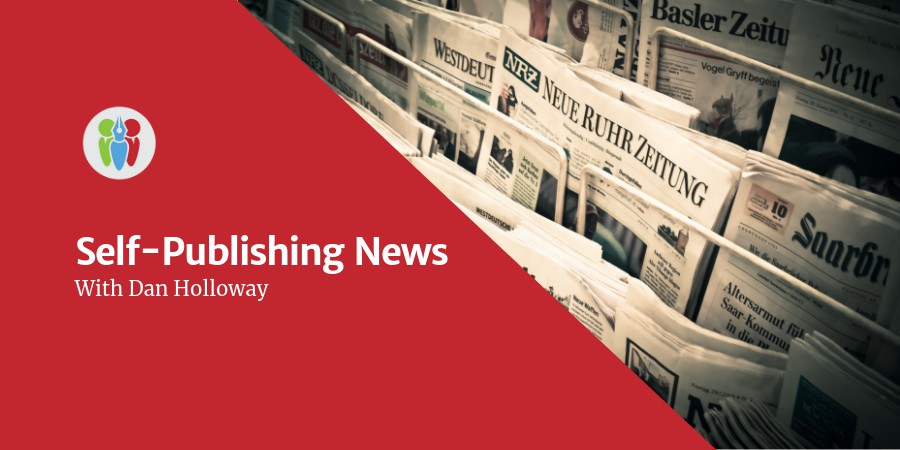
ALLi News Editor Dan Holloway
In this week's Self-Publishing News, ALLi News Editor Dan Holloway takes a look back at what's been in the news in 2019.
I’ve been particularly looking forward to the round up of this year’s news because this year for the first time in a long while, it feels as though things have really changed. Fitting that this should happen in the last year of a decade that we ushered in with such a disruptive boom as the Kindle took hold. Will the 2020s see new possibilities on the level the 2010s did? Almost certainly, but I'm also almost certain if I tried to guess where I'd get it wrong. Oh, and don't forget to also look at Orna's wonderful round up of self-publishing in 2019.
What is reading?

Indie highlight of 2019: Jane Davis wins the Selfies at London Book Fair
Much of the news this year can be distilled into a single existential question. It's not often those crop up in a field. It's even rarer in literature that the question is something other than “is the novel dead?” The question we face at the moment is far more slippery. We devoted a whole conference to it in Oxford and emerged none the wiser. What is reading? We see variations of this question in many of the themes that emerged this year and I'll explore them further in the appropriate places. It comes from several places. And it's intimately tied to a second existential question that will gnaw at us next decade: what is writing? Audio and virtual reality are challenging us to think about reading in a way ebooks never really did. In some cases (literally cases, in the law courts) the industry has appeared to break down over the question. Have a think about it as you read through the news. But probably , like me, you'll skirt the question by giving a different answer. Reading is great!
The continued rise of audio
If the start of the 2010s was all about ebooks, the end of the decade has been all about audiobooks. This year the double digit growth continued. It has prompted some pundits – apparently – to claim that audiobook sales will soon outstrip ebooks. One big breakthrough for indies has been the availability of more ways to record and upload your audiobook than ACX to Audible. The main of these is Findaway Voices, now partnered with Rakuten Kobo.
Audiobooks had already started having people ask what it means to read. And then Audible announced they were introducing a new feature and everything exploded. Audible Captions was THE story of the autumn/fall. The idea of captions for audiobooks came from textbooks, where it captions are a vital accessibility aid. The same would be the case for audiobooks said Amazon. Publishers disagreed. For them this was a rights grab for ebook rights Audible had not contracted. They took out a legal case to stop the feature being released. It's still sub judice. The big issue at stake really is “what is reading?”
Subscription and global opportunities
This year we've seen two trends that offer real possibilities for indies. Subscription has been something of a slow burn. Netflix and Spotify have transformed the music and film industry respectively. And Scribd and Kindle Unlimited have chugged along. But this year we saw the first stirrings of subscription reading gaining at least something of the traction of other industries. Perennial triers Scribd have been a part of that story. But the really interesting development has been the introduction of a paid subscription service from the indie writing behemoth Wattpad, who have also become a publisher.
Subscription intersects with another trend – the expansion of global opportunities in local markets. Storytel, who passed 1 million subscribers this year, have led the charge with their audiobook subscription. And StreetLib have moved significantly closer to their goal of having a local store in every African market.
Technology and opportunity
It's been a year when technology has been in the news a lot. And while blockchain has clearly reached the low point of the Gartner Hype Cycle, artificial intelligence, big data, and virtual/augmented reality have been on the up. But while PublishDrive have embraced AI as a marketing tool, these technologies have been notably absent from book news this year.
The role of libraries
It has been a very rough year for libraries. We ended the year with the rather grim statistic that 800 libraries have closed in the UK in the past decade. But the year's most worrying story has seen libraries and publishers take each other on. Publishers, led by MacMillan, have started restricting libraries' access to new titles. They cite alleged loss of earnings. Libraries are dropping publishers altogether. They cite potentially irreparable damage to the reading landscape.
And finally, this week…
It's the week before Christmas, I thought. They'll be no new news, I thought. But there are two big stories. First the European Union has ruled that there is no resale market for ebooks. And second, I woke up to find the Romance Writers of America trending on twitter. Though hardly for the noblest of reasons. They have suspended writer Courtney Milan for calling out racism (not how they put it). The debate over who can say what in literary circles is clearly going to run for a long time.
A look back at 2019's top #selfpub news stories for #indieauthors, in one quick read, by #ALLi News Editor Dan Holloway @agnieszkasshoes #digitaleconomy #publishingopenup Share on XOver to You
How was 2019? Let us know in the comments below.
Upcoming Conferences and Events
FEBRUARY 2020
San Francisco Writers' Conference, 13-16 Feb [San Francisco]
MARCH 2020
London Book Fair, 10-12 Mar [London]
APRIL 2020
Self-publishing Conference, 25 Apr [University of Leicester] Short story course, 2 Apr – Sep (6 workshops) [London]
AUGUST 2020
Self-publishing Live, 14-16 Aug [Chicago]




